At HubSpot, we are optimistic about the future of SEO, but we're also preparing for many major shifts over the next few years. Advancements like Google's integration of generative AI into search are already changing the digital search landscape.
Many web analysts, SEO strategists, and writers are learning how to leverage AI to create stronger websites and more effective content. This will greatly alter how your competitors approach content creation — and it should alter how you approach it, too.
To shed light on the future of SEO, we've reached out to experts at Semrush, Search Engine Journal, and HubSpot. Keep reading to learn how you should prepare your SEO strategy for 2025 and beyond. And if you want to learn more about the latest in marketing, check out our latest State of Marketing Report.
Predictions on the Future of SEO, and How You Should Prepare [Data + Expert Insights]
Audiences will still want answers from real people.
“AI will change how search works,” says Kyle Russel of Orbit Media Studio. “You may already find it at the top of many search results.”
However, Russel says your audience will still look to your company for answers.
“In the face of all the change and disruption, people still need answers,” he explains. “Your audience needs your help and expertise. As subject matter experts in our niches, we can still publish helpful useful articles and that content can still be discovered, in search results, in AI overviews or in prompt responses in the AI apps.”
Russel says we are still subject matter experts in our niches and that our brands can become the most helpful resource to prospective customers. Marketers just have to adapt.
“Likely, the brand with the biggest digital footprint will win,” he says.
And Russel believes a brand can win by:
- Writing for many websites beyond their own blog
- Collaborating with influencers, especially those who create content
- Appearing on lists, directories, and podcasts
- Conducting original research and making their site the primary source for new data
- Doubling down on social media and email marketing
- Recording videos and making sure the transcript includes the elevator pitch for the brand
- Publishing true thought leadership because strong opinion is the fastest way to differentiate human-made content from AI-generated content.
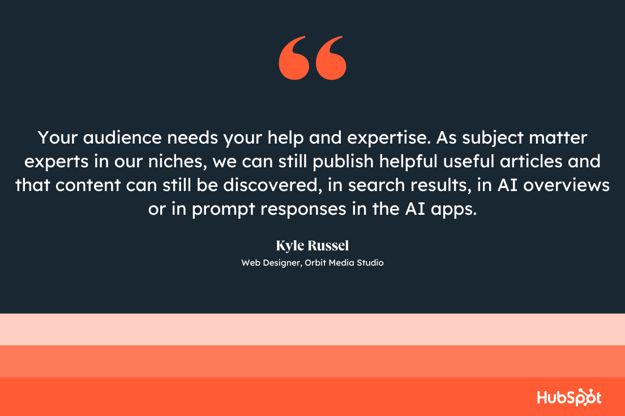
In other words, show off your industry expertise while leveraging as many channels as you can to get your brand in front of your audience and in their ears.
“With a few changes to your content strategy, you may be well suited to win in the new era of content discovery, where you optimize for search, but also optimize the AI, training it to recommend your company and your content,” Russel says.
If you‘re unsure how to get started on updating your content strategy in the age of AI, HubSpot’s AI Search Grader will come in handy.
It's a first-of-its-kind, free app that quickly analyzes your brand based on what your prospects & customers are seeing across AI search engines — then gives you actionable recommendations on how to improve.
The type of content that performs best will change tremendously over the next year.
HubSpot's Senior Director of SEO Global Growth Aja Frost told me: “As a result of the AI evolution, there is an exponential increase in the amount of AI-written, low-value content. And, in response to that, Google is prioritizing first-person, credible, personality-driven content.”
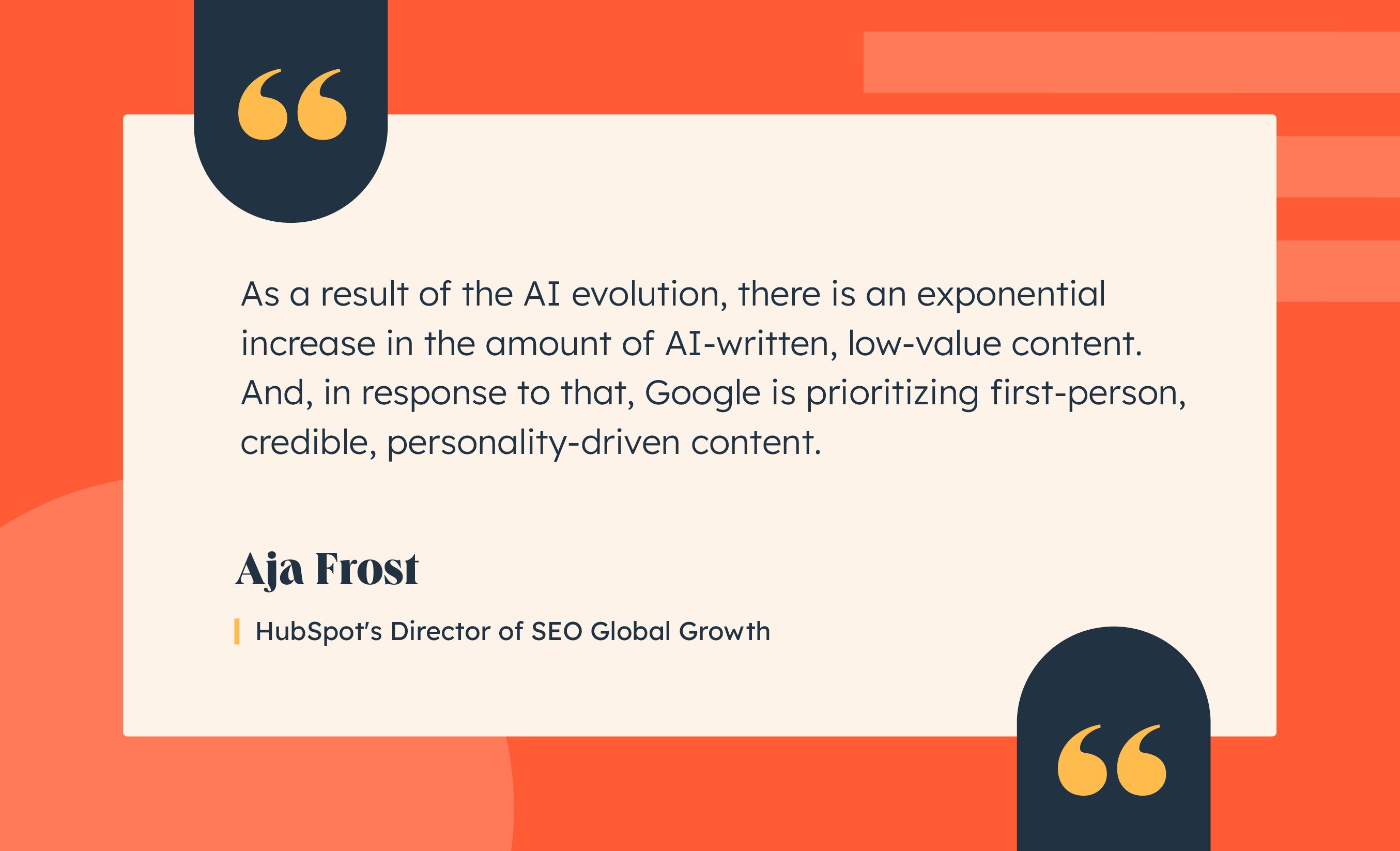
The shift to personality-driven content makes sense. If Google's consumers are flooded with low-value AI content, Google knows:
- The content isn't going to resonate with their audience, and
- Their AI models won't have enough new information to keep learning and adapting.
So, what does this mean for SEO? For Frost and her SEO team at HubSpot, it means drastically increasing their investments in authoritative, human-first perspectives.
And it means a reimagining of HubSpot's existing strategy, with a greater emphasis on perspective-driven content and emerging channels.
Human-first perspectives will win over more traditional, educational posts.
Over the next few years, expect to see branded content that is written from the perspective and experience of the content's creator.
“For years, most companies I wrote for required me to write in their brand's voice,” HubSpot blogger Erica Santiago recalls. “I never had to dive into my own experiences or pepper in my own sense of humor. It was all very clinical detached. And that was the tone of most branded listicals and articles I'd find in my own search results as well.”
But she says she's already seeing and experiencing a shift as AI gains more traction in SERPs.
“I wrote an article recently for HubSpot about email marketing trends, and I ended up citing marketing emails in my own personal inbox to ensure I was writing perpsective driven-content that AI couldn't emulate,” she says.
Santiago explains, “Now, when I read branded content, I notice writers are citing their own unique experiences and injecting their personality as well.”
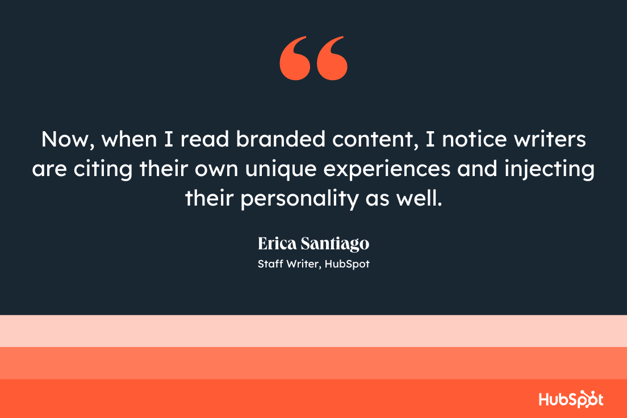
Frost told me that now, she does not distinguish between SEO and editorial. For a post to rank, it needs to meet certain criteria for both.
She says, “That means looking at every piece of content and asking, ‘How do we make this a really unique, compelling piece of content that you can’t find anywhere else on the web? And how can we ensure it‘s written by someone who has unique expertise on the topic?’”
Brands will have to optimize their content for voice search.
AI is used in voice search to improve language recognition, personalization, and accuracy. As AI becomes more integrated in search engines like Google, users will likely see more improvements in tools like voice search.
It's also worth noting that voice search is being used more and more when searching for information online.
According to DataReportal, 30% of internet users aged 16-64 worldwide use voice assistants each week. What's more, 45% of Americans report using voice search on their smartphones.
 (506 x 253 px).png?width=540&height=270&name=Copy of Facebook Shared Link - 1200x628 - Percentage + Copy - Light (600 x 300 px) (506 x 253 px).png)
So, what does this mean for SEO? Well, it simply means brands will need to optimize their content for voice search results. Marketers can do this by:
- Leveraging features snippets
- Optimize your website for mobile users
- Use long-tail keywords and words like “how,” “what,” and “where” when possible
Web analysts predict trustworthiness will become the most important ranking factor in the SERPs.
When it comes to Google’s E-E-A-T, web analysts say that trustworthiness will become the most important factor in ranking highly on SERPs, followed by expertise, experience, and authoritativeness.
It makes sense that trustworthiness will continue to matter most in the coming years since trustworthiness is essentially the sum total of the other three rating factors.
In other words, your website's rating for expertise, experience, and authoritativeness helps Google dictate how trustworthy your website is overall.
I spoke with Katie Morton, Search Engine Journal's Senior Managing Growth Editor, to learn her tips for increasing trustworthiness.
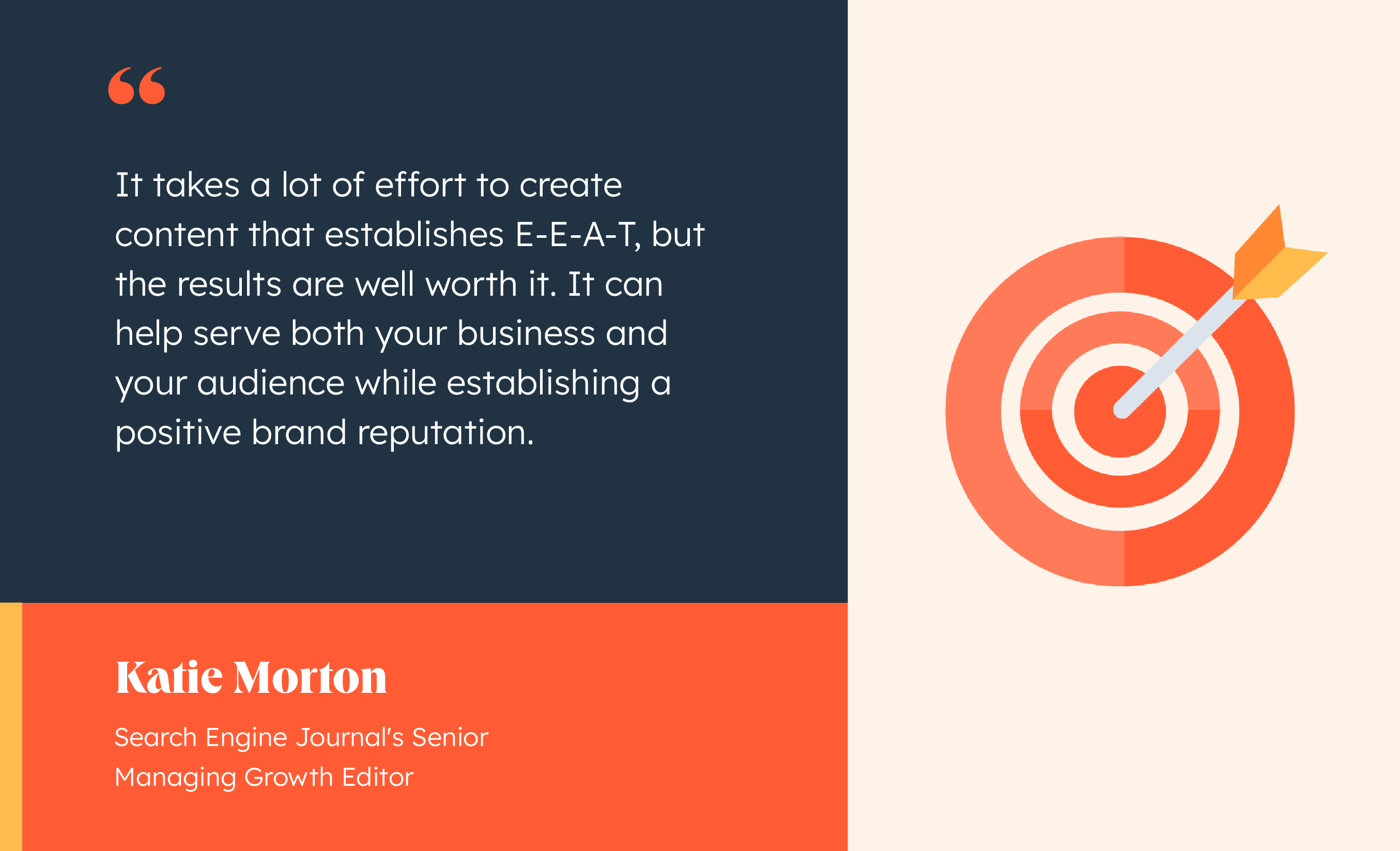
She told me, “Since Experience, Expertise, and Authoritativeness Support Trust, it’s best to look at the whole of the E-E-A-T concept rather than focusing on any single aspect of the acronym.”
That said, Morton points out that Google's Search Quality Rater Guidelines specifically call out the following three points to increase Trust:
- E-commerce sites with secure online payment systems and reliable customer service
- Honest product reviews meant to inform rather than solely to drive purchases
- Accurate content about Your Money or Your Life (YMYL) topics to prevent harm
She continues, “For companies looking to increase trustworthiness, again, it’s important to address all aspects of E-E-A-T. Here are my suggestions”:
- Expert Authors: Source content from authors with direct experience, a depth of knowledge, and expertise in the topic they are writing about. Anyone could Google a subject and write an article about it, but if the writer isn’t a subject matter expert, this doesn’t establish E-E-A-T. Having recognized experts and authorities in your industry as authors on your site can boost the credibility of your website and brand. On your website, provide bios of your authors and content creators that include their expertise, experience, and credentials.
- Accurate Content From Trusted Sources: Publish truthful and well-researched content that cites credible sources. Support claims via the experience and expertise of the author’s first-hand knowledge, with research and statistics from trustworthy sources, or both.
- Originality and Value: Ensure that your content is original, substantial, comprehensive, and provides valuable insights. Content that provides value to users is more likely to be shared. When a piece of content gets positive attention through shares and backlinks, it can lend a sense of authority when your content is cited as a trusted source.
Morton adds, “It takes a lot of effort to create content that establishes E-E-A-T, but the results are well worth it. If you follow these suggestions, you will also create Helpful Content, which Google strongly encourages.
This can help serve both your business and your audience while establishing a positive brand reputation.”
Marketers will leverage social search and other platforms.
Search engines are still dominant, but social search is growing in popularity, especially among Gen Z, Millennials, and Gen X.
In fact, 31% of consumers use social search when looking for answers to questions online, and 1 in 4 consumers age 18-54 actually prefer social search over search engines.
This could have a major impact on the future of SEO by shifting your focus from Google to Instagram, TikTok, and other social platforms.
HubSpot's Santiago has first-hand experience with this shift.
“I'm leading a quick-hit video initiative with other HubSpot bloggers so we can add more value to our posts for readers as well as get more eyes on our content,” she explains. “This means we're making videos for platforms like Instagram, TikTok, and YouTube Shorts and then embedding these videos into our posts.”
Santiago says with more people using the above platforms as seach engines, it‘s important marketers create content for these channels that leverage back to the brand’s website.
“I don't Google things nearly as much as even just a year ago,” she says. “Just the other day I looked up ‘Best platform sandals for the summer' on TikTok and found so many new brands I ended up following. I even bought a pair directly from one brand's Instagram. A year or two ago I would have Googled that query and bought from the brand's website.”
Marketers who optimize their accounts for social search have three top strategies:
- Include relevant keywords and hashtags in your social posts.
- Include relevant keywords and hashtags in your bio.
- Make sure that your username is easy to search for.
I've seen the power of social search first-hand. When I hear about a new brand, I don’t Google them anymore — I search for their Instagram account. And oftentimes, their social media page is the determining factor in whether I end up purchasing one of their products.
While it's early days, social media might someday take the lead in product discovery. Many users prefer visuals over text, so it makes sense that they might not want to read a lengthy webpage about a product:
They just want to see it in action.
Additionally, SEO experts are leaning more heavily into multimedia content to expand beyond search regarding opportunities for reaching audiences.
This makes sense: During volatile times, it's critical your business becomes adaptable, and you learn how to find new avenues to obtain traffic and leads.
As Frost told me, “At HubSpot, we are dramatically increasing our investment in other types of media, like video, podcasts, newsletters, and types of media that will be far less affected by the changes in search happening on Google.”
AI will change how SEOs and content creators do their jobs.
And finally, for the least surprising prediction in this list: AI will change how SEOs and creators do their work.
In fact, half of blog writers already use AI, and 74% of web analysts say it improves their content's performance and ranking on the SERPs.
Over 50% of web analysts also already incorporate AI tools into their workflow.
Some of these analysts are gradually testing it and comparing results to performance without AI, while other analysts are building entirely new teams to leverage AI.
In particular, these web analysts are using AI for specific tasks, including keyword research, automating tedious tasks, optimizing their websites, and idea generation.
When used correctly, AI can drastically improve an SEO team‘s strategy. That’s why it’s critical to work with AI, not against it, as you consider how you might shift your strategy to meet these new challenges.
… And it will greatly improve marketers' web optimization strategies.
Kyle Byers, Director of Organic Search at Semrush, told me there are innumerable ways marketers can leverage AI.
As he puts it:
“AI is incredibly powerful and flexible in what it can help marketers accomplish — from purpose-built tools like our own ContentShake (AI content generator app) and SEO Writing Assistant to general chat-based interfaces like ChatGPT, Bing Chat, and Google's Gemini.”
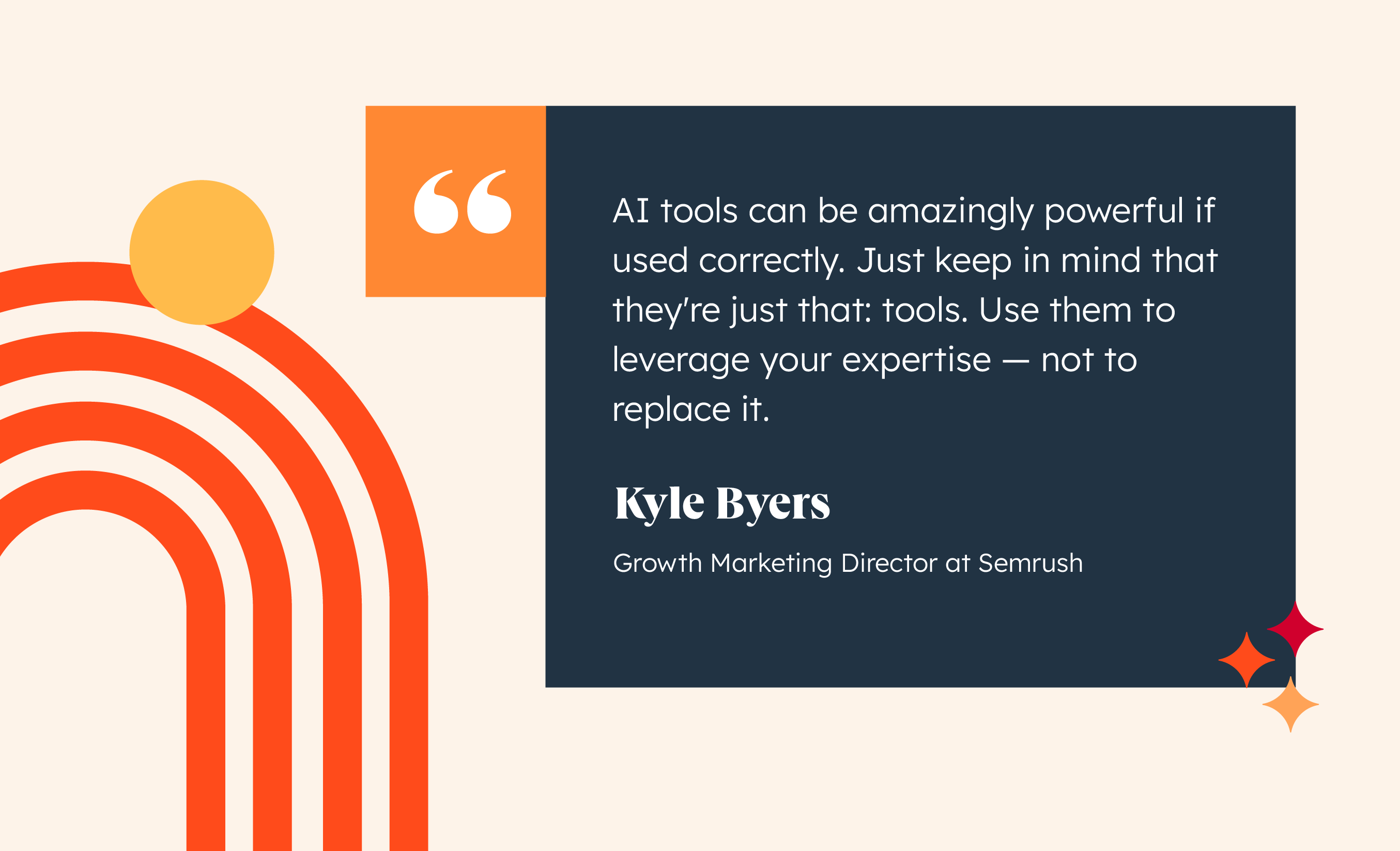
AI can also help marketers optimize their websites.
Here are some of the ways Byers suggests marketers leverage AI for web optimization:
- Conversion copywriting. (“Act as a tech-savvy small business owner who is shopping for accounting software. Grade the following landing page headlines on a scale of 1 to 10 based on how likely they are to make you want to try or purchase my product, then draft five new headline ideas that would be more compelling.”)
- Rephrasing content. For example, simplifying a long paragraph or sentence to meet an 8th-grade reading level. Or rewriting content to make it more unique, to strike a different tone, or to follow your brand’s style guide.
- Getting “unstuck” with content writing. (“Help me finish the following paragraph.”)
- Brainstorming additional angles to add to your content. (E.g. “Act as a sales manager who wants to develop an internal training program for improving your team’s sales skills. What important subtopics or angles are missing from the following content, which you would want to learn more about?”)
- Quickly drafting a list of 10 possible title tags and meta descriptions for a given webpage.
- Generating Schema markup. (E.g., “Generate FAQPage Schema markup for the following FAQs.”)
- Generating tags for different languages/locations.
- Translating content from one language to another.
- Generating regular expressions (for example, using Google Search Console or Google Analytics).
- Generating new robots.txt rules will also help understand existing robots.txt rules.
He adds, “AI tools can be amazingly powerful if used correctly. Just keep in mind that they're just that: tools. Use them to leverage your expertise — not to replace it.”
(Interested in trying Semrush for yourself? Click here for an exclusive extended 14-day PRO free trial for HubSpot readers.)
The Next Evolution of SEO
AI is here to stay, and with it comes a new dawn of SEO. As a content creator long-trained in the art of writing for SEO, I'm personally thrilled about this evolution.
It will require businesses to recalibrate and put innovative, novel, human-first perspectives ahead of rote, cut-and-dry content.
As a marketer, nothing could make me happier.
Curious about the other posts in this Series? Check out:
- 2024 AI Trends for Marketers
- The 2024 State of Marketing & Trends Report: Data from 1400+ Global Marketers
- Next Gen Search: Consumer Trends and the Future of SEO
- Content Is King: How Startups Can Unlock Growth With SEO
- 6 Steps Bloggers are Taking to Prepare for AI in Search [New Data]
- The HubSpot Blog’s 2023 Web Traffic & Analytics Report [New Data]

![Download Now: Free State of Marketing Report [Updated for 2024]](https://localseoresources.com/wp-content/uploads/2024/08/db725f24-564c-483b-a28c-2d6ff9986516-2.png)

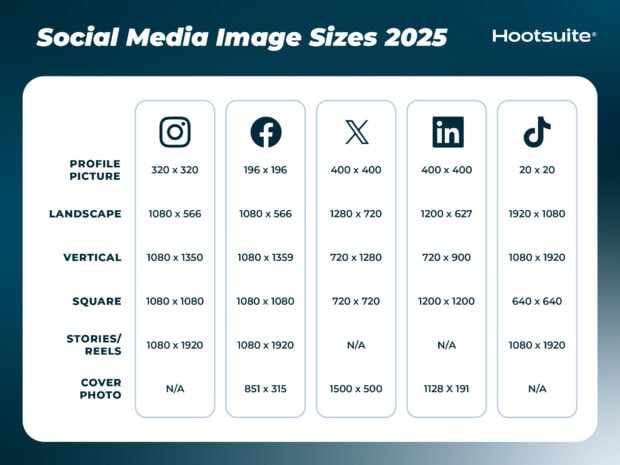


This post raises some incredibly relevant points about the evolving landscape of SEO, particularly in light of AI advancements. I resonate deeply with the idea that while AI can enhance how we produce and intersperse content, the foundational need for human perspective and connection remains critical.
You make some excellent points about the balance between AI and human insight in SEO. It’s fascinating how technology has transformed not just marketing strategies but the way we engage with content on a personal level. I find it interesting to think about how AI can help us analyze data and streamline processes, but when it comes to the emotional connection and storytelling that resonate with audiences, that’s where human touch really shines.
You raised some insightful points. The balance between AI and the human touch really is crucial in navigating today’s content landscape. While AI can crunch numbers and spot trends in a heartbeat, the emotional resonance that comes from storytelling is something that requires a human perspective.
You’ve touched on something that resonates deeply with me. The interplay between AI and human creativity has been a hot topic for a while, and it’s fascinating to see how it evolves. AI’s ability to analyze data is impressive, but when it comes to storytelling, there’s definitely a unique spark that only human experience can ignite.
I recently came across an article that delves into the evolving role of AI in SEO, and it further expands on how balancing technological efficiency with human storytelling remains essential in our content creation efforts.
‘Is ChatGPT the Future of SEO?’
https://localseoresources.com/is-chatgpt-the-future-of-seo/.
It’s such a compelling topic, isn’t it? The tension between AI’s analytical prowess and the irreplaceable depth of human storytelling is something I think about often. I find that while AI can produce content that is optimized for search engines, it often lacks the nuance that comes from lived experiences and emotions. That unique spark you mentioned is often where the magic happens—when a storyteller infuses their personal journey into their narratives.
I recently read something that really highlighted the importance of accessibility in storytelling; it offers practical tips on adding captions to videos, reinforcing how vital it is for everyone to engage with content fully.
‘How to add captions to your videos’
https://localseoresources.com/how-to-add-captions-to-your-videos/.
You bring up a compelling point about the dynamic between AI capabilities and human creativity, especially in the realm of storytelling. It’s an interesting conversation, one that often gets bogged down in either fervent optimism or outright skepticism. Your mention of the unique spark that human experience brings to storytelling really highlights what I think is at the core of this discussion.
Absolutely, the blend of AI efficiency and human storytelling is crucial! If you’re interested in exploring this further, I highly recommend checking out the article “Is ChatGPT the Future of SEO?”—it offers great insights on how this balance plays out in content creation. You can read it [here](https://localseoresources.com/is-chatgpt-the-future-of-seo/).
https://localseoresources.com/ninja
You raise some really compelling points about the balance between AI and human insight in SEO. It’s true that technology has reshaped not only marketing strategies but also how we connect with content on a deeper level. The ability of AI to crunch data and identify trends can be a real game-changer, especially when it comes to optimizing for search engines and reaching targeted audiences more effectively.
You bring up some important points about the interplay between AI and human insight in SEO. I’ve noticed that as AI continues to evolve, it’s not just about the data crunching anymore. It’s also about understanding the nuances of language and human emotion that can drive deeper connections with the audience.
I found this article on preparing for the holiday season SEO to be a practical guide; it offers solid tips that complement the idea of blending AI insights with human creativity for effective marketing strategies.
‘Holiday season SEO: 7 tips to start preparing!’
https://localseoresources.com/holiday-season-seo-7-tips-to-start-preparing/.
You’ve really touched on an important aspect! The synergy between AI and human insight is a fascinating area to explore. While AI excels at crunching numbers and spotting trends, we often bring the nuanced creativity and emotional understanding that can make content resonate.
You’re touching on a crucial aspect of the dynamic between technology and human intuition. The potential of AI in SEO is definitely adventurous; it’s like having a supercharged analytics assistant that doesn’t tire. However, while it’s fantastic at crunching numbers and spotting patterns, there’s a lingering question about what gets lost in the process.
It’s true—the interplay between AI and human insight in SEO opens up so many dimensions for discussion. I’ve noticed that while AI can provide incredible analytical capabilities and efficiency, it often lacks that nuanced understanding of human emotions that drives meaningful engagement. For instance, when crafting content, it’s not just about keywords and rankings. It’s about the stories we tell and how those stories connect on a deeper level.
I recently came across an article that delves into how AI can enhance SEO strategies while still respecting the invaluable human element in storytelling and connection.
‘How to Use AI SEO to Improve Your Website’
https://localseoresources.com/how-to-use-ai-seo-to-improve-your-website/.
It’s great to hear that you connect with those thoughts. The rise of AI really challenges us to think about what makes content resonate. Sure, AI can crunch data and spit out well-structured articles, but it can’t replicate the nuances of human experience and emotion.
You’ve touched on something really profound. The distinction between AI-generated content and human-created narratives lies in those subtle layers of emotional depth and lived experience. It reminds me of a conversation I had with a friend who works in creative writing. We discussed how storytelling has evolved with technology, yet there’s an undeniable magic that comes from personal connection.
It’s refreshing to hear your thoughts on the interplay between AI and the human touch in SEO. The landscape is changing so rapidly, and as we embrace new technologies, it’s easy to get lost in the tools and techniques while overlooking the core elements that really connect us with our audience.
It’s interesting to see how many people are thinking along the same lines about the balance between AI and the human touch in SEO. With all the tech advancements, it can be tempting to rely solely on algorithms and data analytics. But at the end of the day, content is meant to connect with people, and that’s where the human perspective really shines through.
You’re spot on about that balance between AI and the human touch in SEO. It’s so easy to get sucked into the world of data and algorithms, particularly when they can provide insights that seem irrefutable on the surface. But, as you said, content’s ultimate purpose is to connect with people—something that can often get lost in the numbers.
I appreciate your thoughts on this topic; it’s a conversation that really needs to happen as we navigate the changes in the SEO landscape. AI is certainly a game-changer, making tasks more efficient and opening up new avenues for content creation. But your point about the human touch is critical.
You bring up such an important point about the balance between efficiency and the human touch in content creation. AI has definitely reshaped our approach to SEO and content, making it easier to generate ideas and organize information. However, I often think about how much nuance and emotion a human writer brings to the table. There are subtleties in language and perspective that AI struggles with, especially in topics that require empathy or cultural context.
I found this insightful piece that dives into what experts anticipate for digital content in 2025, which adds depth to our discussion about balancing AI’s efficiency with the vital human touch.
‘What Is Digital Content? I Asked Experts What to Expect From It in 2025 — Here’s What They Said’
https://localseoresources.com/what-is-digital-content-i-asked-experts-what-to-expect-from-it-in-2025-heres-what-they-said/.
I completely resonate with your thoughts on this topic. The blending of AI and SEO is indeed fascinating, and it feels like we’re at a crossroads where technology can significantly enhance our efforts. The efficiency gains are tangible—AI can process vast amounts of data and spot trends that might take a human much longer to identify. But you’re right; those human insights and emotional connections are irreplaceable.
It’s great to see others recognizing the importance of this conversation, especially as the landscape shifts so rapidly. AI does bring a level of efficiency that can be hard to ignore, and it certainly has the potential to enhance the creative process in ways we’re just beginning to explore.
It’s intriguing to see how rapidly the landscape of SEO and digital marketing is evolving, especially with the integration of generative AI into search engines. I’ve been following these trends closely, and I can’t help but reflect on how they’ll affect our overall approach to content creation and user engagement.
You know, it’s wild to think about how quickly this whole landscape is shifting, isn’t it? I mean, just when I think I’ve got a handle on SEO, along comes generative AI, and it feels like I’m trying to catch a greased pig at a county fair. It’s all about staying nimble now, especially in content creation and user engagement, where you just can’t afford to get left behind.
It really is wild how fast things are evolving. I can relate to that feeling of chasing a greased pig—every time you think you have a grasp on one aspect of SEO, something new comes along to shift the ground beneath your feet. Generative AI is definitely a game-changer in that regard, turning traditional approaches upside down.
The rapid pace of change in SEO and digital marketing has definitely been a wild ride, hasn’t it? It’s like trying to catch a cab in the rain while juggling an umbrella, your phone, and a coffee. Generative AI feels like that secret weapon everyone was waiting for—one minute it’s just us with our keywords, and the next, it’s like a bunch of hyper-intelligent robots stepping in with their shiny algorithms ready to play.
I couldn’t agree more with your observations on how rapidly the landscape of SEO and digital marketing is evolving. The integration of generative AI is definitely a game-changer. It has the potential to not just enhance search engine algorithms but also transform the way we create content. I mean, the ability to tailor personalized experiences for users is becoming more sophisticated, and it raises some interesting questions about the authenticity of content as we lean more on AI tools.
You’ve nailed it with your observations about generative AI in the digital marketing space. It’s fascinating to think about how we’re shifting away from one-size-fits-all content strategies to something much more personalized. This evolution is definitely raising questions around authenticity, especially as users become more aware of the AI-generated content landscape.
I found an insightful piece that reflects on some of the most impactful Moz blog posts from 2020, which really deepens the understanding of how SEO and digital marketing have been shaped by the rise of new technologies like generative AI.
‘They’re Simply the Best: The Top 25 Moz Blog Posts of 2020’
https://localseoresources.com/theyre-simply-the-best-the-top-25-moz-blog-posts-of-2020/.
I find it fascinating how the integration of generative AI into search can transform our approach to SEO. It’s intriguing to think about how we’ll balance AI-generated content with the need for a genuine human touch. I agree with the sentiment that audiences prefer answers from real people, as it fosters a connection that’s hard for AI to replicate.
I share your fascination with how generative AI is changing the landscape of search and SEO. It’s definitely a double-edged sword. On one hand, AI can produce vast amounts of content quickly and even optimize it for specific keywords, which is incredibly useful for businesses looking to increase their online visibility. On the other hand, as you mentioned, there’s something irreplaceable about the human touch in communication.
I recently came across some insightful posts that delve into the evolving landscape of SEO and could really complement our thoughts on blending AI with that authentic human touch.
‘They’re Simply the Best: The Top 25 Moz Blog Posts of 2020’
https://localseoresources.com/theyre-simply-the-best-the-top-25-moz-blog-posts-of-2020/.
You raise an important point about the need for a genuine human touch in a world increasingly shaped by AI. It’s true that while generative AI can churn out content at lightning speed, it often lacks the emotional depth and personal insights that resonate with audiences. People connect with stories, experiences, and authenticity, which are rooted in our unique human perspectives.
This is a fascinating exploration of the evolving landscape of SEO. The integration of generative AI into search engines is indeed a game changer. While tools like these can enhance content creation, the emphasis on authentic human interaction remains crucial. I’ve found that even as AI proliferates, users still gravitate toward content that feels personal and relatable.
I find the topic of SEO’s evolution particularly intriguing, especially as we see AI making its mark in the digital landscape. It’s fascinating to think about how AI, with its data-crunching capabilities, could not only affect how we optimize our content but also how audiences engage with search results. While generative AI can produce content at lightning speed, there’s something fundamentally human that audiences still crave—real insights and authentic voices.
It’s interesting to think about the balance between AI efficiency and the human touch, especially in a field as dynamic as SEO. I agree that while generative AI can churn out content quickly, it often lacks that personal connection which resonates with audiences. I often reflect on how important authenticity has become in today’s digital landscape.
You raise such a valuable point about the balance between AI efficiency and the human touch in SEO. The rapid development of generative AI has certainly transformed the way we approach content creation, but it’s that genuine human connection that can create lasting impact. I often find myself reflecting on how authenticity shapes our online interactions and the trust we establish with our audiences.
Speaking of authenticity, it’s worth exploring how diverse voices in SEO enrich our understanding and connection in this ever-evolving field, especially when it comes to fostering a more inclusive digital landscape.
‘Diversity and Inclusion in SEO: BIPOC and LGBTQ+ SEOs Share Their Experiences’
https://localseoresources.com/diversity-and-inclusion-in-seo-bipoc-and-lgbtq-seos-share-their-experiences/.
You’ve captured the essence of what makes SEO more than just a technical endeavor—it’s about building relationships and fostering community. The nuances of human connection, especially in a digital landscape increasingly driven by AI, can’t be overstated. While AI can churn out content rapidly, it’s our unique perspectives and genuine voices that truly resonate with our audiences.
You’ve touched on something really important with the idea of authenticity in our online interactions. It’s so true that while AI can streamline processes and even create impressive content, the connections we build with our audiences rely on a genuine human touch. When readers feel a personal connection, it enhances trust and loyalty.
You’ve touched on something really important with the idea of authenticity in our online interactions. I often think about how the digital landscape can sometimes feel so mechanical, despite our attempts to be more personal. One thing I’ve noticed is how audiences are increasingly craving that genuine connection, particularly in a world overflowing with content.
I found an interesting piece that dives into how customer reviews play a crucial role in building that genuine connection and trust with audiences.
‘Customer reviews increase users’ trust’
https://localseoresources.com/customer-reviews-increase-users-trust/.
You bring up a compelling point about the authenticity needed in today’s digital landscape. The contrast between AI efficiency and that human touch really plays a crucial role, especially in fields like SEO where audience engagement is key. I’ve noticed that while AI tools can generate content at an impressive speed, they often miss the nuances of personal stories and experiences that create a genuine connection with readers.
You nailed it! AI can churn out content faster than my coffee brews in the morning, but there’s something about a well-told personal story that makes you want to lean in a little closer. It’s like the difference between a chef serving you a beautifully plated dish and someone just slapping a frozen meal on the table.
It’s great to dive into this topic, especially since SEO and AI are intertwined in such a dynamic way right now. The evolution you’ve mentioned reflects a broader trend in our digital interactions; as algorithms become more sophisticated, the balance between technical optimization and human connection gets more complicated.
I completely understand where you’re coming from. The intersection of SEO and AI really does feel like a living, breathing organism that’s constantly evolving. It’s fascinating how algorithms are becoming more adept at understanding human behavior, not just in terms of keywords but in grasping context and intent. I think it leads to a unique challenge—how do we maintain that human touch while leveraging the technical side of SEO?
It’s fascinating to see how user engagement is reshaping SEO; I recently came across an article that explores how fostering genuine connections can elevate search rankings in this evolving landscape.
‘User Engagement Is the New SEO: How to Boost Search Rank by Engaging Users’
https://localseoresources.com/user-engagement-is-the-new-seo-how-to-boost-search-rank-by-engaging-users/.
You’ve touched on a critical point about the balance between the technical and the human aspects of SEO. The evolution of algorithms reflects a growing understanding of context and intent, which, as you noted, is fascinating. It’s almost as if search engines are beginning to think and feel in ways we’ve always believed were essential to human interaction—grasping not just what we search for, but why we search.
It’s really interesting to consider how the evolution of SEO and AI intersect. The speed at which generative AI can produce content is mind-boggling, yet your point about audiences craving real insights and authentic voices highlights a crucial aspect of digital engagement. I think we’re reaching a point where the challenge lies not just in producing content but in ensuring it resonates on a human level.
You’ve touched on such a nuanced aspect of the evolving landscape. The intersection of SEO and AI really does create a unique challenge, especially as we see content creation becoming quicker and more automated. I’ve noticed that while tools like generative AI can churn out information at breakneck speed, they still often lack that deeply human understanding.
The integration of generative AI into the search landscape indeed marks a significant turning point for SEO and content creation. As this technology evolves, it’s essential for digital marketers and content creators to rethink their strategies. While AI can produce vast amounts of content quickly, the human touch—authenticity, emotional connection, and nuanced understanding—remains irreplaceable.
You’ve touched on an important aspect of the evolving landscape we’re navigating with generative AI. The speed and scale at which AI can churn out content are remarkable, no doubt. But as you noted, the human element plays a critical role in how that content resonates with audiences. It’s fascinating to think about how the balance between technological advancement and human ingenuity will shape the future of content creation.
You bring up a really interesting point about the balance between generative AI and the human touch in content creation. It’s fascinating to think about how this technology can process and generate content at lightning speed, yet it often lacks that personal nuance that truly resonates with people.
You’ve struck quite a chord with this discussion on the evolving nature of SEO, and I can’t help but chuckle a bit at the irony. After all, in a world where we’re actively courting algorithms and AI to help us engage our audiences, it’s almost like we’ve set up a tangled love triangle—us, AI, and our reluctant audience, who only wants an answer that feels less like an automated voice on the other end of their phone and more like a chat with a wise friend over coffee.
It’s intriguing how you put it—a tangled love triangle is a fitting metaphor for the current landscape of SEO and content creation. It does feel like we’re often caught between our desire to cater to algorithms and the authentic connections we want to foster with our audience.
It’s fascinating how much the dynamics of SEO can reflect our own attempts at human connection; if you’re curious about how to navigate this tricky terrain in Georgetown, I found a piece that breaks down the costs in a way that feels less like a sales pitch and more like a friendly chat.
‘Local Georgetown SEO – How Much Should You Pay?’
https://localseoresources.com/local-georgetown-seo-how-much-should-you-pay/.
I appreciate your perspective on the love triangle that is SEO and content creation. It really does feel like a balancing act, doesn’t it? On one hand, we’ve got these algorithms dictating what gets attention, while on the other, there’s our innate desire to connect genuinely with our audience. It’s a constant push and pull that can be exhausting—but also rewarding when you strike that right chord.
It’s great to see your perspective on the love triangle of SEO and content creation. The struggle to balance algorithmic demands with genuine audience connection feels like a complex dance, doesn’t it? Many content creators and marketers grapple with ensuring their work resonates with a human audience while still meeting those sometimes rigid SEO standards. It’s an ongoing negotiation—one where both parties have valid needs.
I appreciate your thoughts on the complexities of balancing SEO with authentic engagement! If you’re interested in exploring how to navigate this landscape in Georgetown, I found this helpful resource that offers valuable insights without the sales pitch vibe. Check it out: “Local Georgetown SEO – How Much Should You Pay?” [insert link].
https://localseoresources.com/ninja
You’ve captured something really interesting about our dynamic with technology and our audiences. It does feel like we’re navigating this intricate dance, trying to embrace the efficiencies AI offers while still longing for that human touch. In many ways, it’s a reflection of our broader societal shift towards automation and instant gratification, isn’t it?
It’s interesting to see how small business SEO can intertwine with local search, almost like our own chat when trying to balance those algorithmic demands with genuine human connection in marketing.
‘Small business SEO and local search: the ultimate guide’
https://localseoresources.com/small-business-seo-and-local-search-the-ultimate-guide/.
The insights you’ve shared truly resonate with the evolving landscape of SEO, particularly as we grapple with the implications of generative AI integration in search. As we venture further into 2025 and beyond, it’s crucial to consider not just how AI will shape our strategies but also how it will redefine our relationship with audiences.
You’ve captured a significant point about the intersection of SEO and generative AI. As we move through 2025, I find myself reflecting on how this evolution not only affects our strategies but also transforms how we engage with our audiences. It’s fascinating to think about the changing dynamics of trust and authenticity in the content we produce.
It’s fascinating to see how the integration of generative AI is reshaping SEO practices. I completely agree that while AI can streamline content creation, the human touch remains crucial. People still crave authentic voices and nuanced perspectives that AI might not fully capture. This tension between efficiency and genuine connection will be interesting to navigate as we refine our strategies for the future.
The balance between efficiency and authentic connection in the realm of SEO and content creation is definitely a delicate one. Your point about the human touch is spot on. While generative AI can churn out content at an impressive speed, it often lacks that intricate understanding of human emotion and experience that resonates with readers.
“Absolutely! If you’re interested in exploring how to strike that perfect balance between AI efficiency and authentic engagement in your SEO strategies, check out our latest insights here.”
https://localseoresources.com/ninja